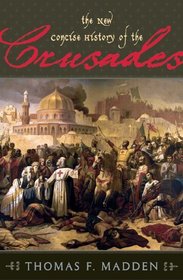This book provides an excellent look at the crusades, putting them in perspective for their time and in relation to current world politics. It is a great overview for the uninitiated and a great review for folks who have studied the crusades.
The book opens by providing a setting just prior to the first crusade, placing us in the mindset of Medieval Europeans. From there, the information is laid out chronologically. The book closes with the authors analysis of how the crusades were held up as examples of chivalry, later to be reviled as early colonialism, and finally how they relate to modern politics. The pacing is good, not getting bogged down in minutiae or in lists of dry ancient reference texts. Occasionally, there were more names being used than I could keep easy track of, simply because I was unfamiliar with the subject matter.
I learned quite a bit from this book and that makes me happy. Before listening to this book, what little I know came from popular movies and books, and, of course, I couldnt rely on those to be accurate. I really liked how the book was laid out chronologically and I deeply appreciated the authors constant efforts to have the reader think like a Medieval European.
In addition to this, the author often gave examples of Muslim impressions of the crusades. This in particular was fascinating. For Europeans, and even Americans, the crusades were a big deal, and continue to influence our culture, if mostly through popular media. At the time of the crusades, the Muslim world barely took note of them, seeing them as just yet one more barbarian force to be repelled (and the crusades were often repelled). The crusades had a greater impact on the Byzantine Empire, mostly because places were sacked and sometimes burned.
It was fascinating to see how the crusades evolved over time. Initially, the word crusade was not associated with the pilgrims who ventured east for religious enrichment. Old, young, sick, healthy, men, & women traveled on pilgrimage. It was only later that such pilgrimages became armed men crusading to the east, with the blessing of pope and lord, to defend Christian lands.
In short, this book was an excellent read and definitely worth shelf space as a reference work. It is chock full of info on the European leaders, the Byzantine reactions, the few bits directly affection Muslim affairs, and how the crusades were affected by the Mongols. The book does an excellent job of placing the reader in a Europe steeped in a religious culture and how that affected, even directed, the actions of European leaders. Its even worth a reread.
Narration: Claton Butcher gave a good performance. He had a clear voice that used a little emotion as needed, so it was not textbook dry. He also went to the effort of pronouncing people and place names with the correct accents. Such touches are so appreciated by this listener!
The book opens by providing a setting just prior to the first crusade, placing us in the mindset of Medieval Europeans. From there, the information is laid out chronologically. The book closes with the authors analysis of how the crusades were held up as examples of chivalry, later to be reviled as early colonialism, and finally how they relate to modern politics. The pacing is good, not getting bogged down in minutiae or in lists of dry ancient reference texts. Occasionally, there were more names being used than I could keep easy track of, simply because I was unfamiliar with the subject matter.
I learned quite a bit from this book and that makes me happy. Before listening to this book, what little I know came from popular movies and books, and, of course, I couldnt rely on those to be accurate. I really liked how the book was laid out chronologically and I deeply appreciated the authors constant efforts to have the reader think like a Medieval European.
In addition to this, the author often gave examples of Muslim impressions of the crusades. This in particular was fascinating. For Europeans, and even Americans, the crusades were a big deal, and continue to influence our culture, if mostly through popular media. At the time of the crusades, the Muslim world barely took note of them, seeing them as just yet one more barbarian force to be repelled (and the crusades were often repelled). The crusades had a greater impact on the Byzantine Empire, mostly because places were sacked and sometimes burned.
It was fascinating to see how the crusades evolved over time. Initially, the word crusade was not associated with the pilgrims who ventured east for religious enrichment. Old, young, sick, healthy, men, & women traveled on pilgrimage. It was only later that such pilgrimages became armed men crusading to the east, with the blessing of pope and lord, to defend Christian lands.
In short, this book was an excellent read and definitely worth shelf space as a reference work. It is chock full of info on the European leaders, the Byzantine reactions, the few bits directly affection Muslim affairs, and how the crusades were affected by the Mongols. The book does an excellent job of placing the reader in a Europe steeped in a religious culture and how that affected, even directed, the actions of European leaders. Its even worth a reread.
Narration: Claton Butcher gave a good performance. He had a clear voice that used a little emotion as needed, so it was not textbook dry. He also went to the effort of pronouncing people and place names with the correct accents. Such touches are so appreciated by this listener!




